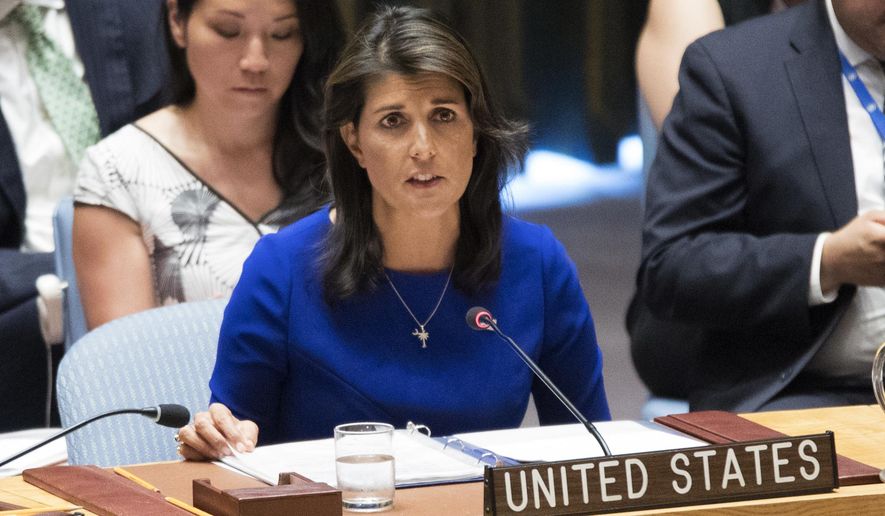During her almost two years serving as President Trump’s ambassador to the United Nations, Nikki Haley carved out a distinct niche as the administration’s most prominent voice confronting Latin America’s leftist regimes and even joined the occasional street demonstration.
“We are going to fight for Venezuela, and we are going to continue doing it until [Venezuelan President Nicolas] Maduro is gone,” Mrs. Haley shouted through a bullhorn to protesters outside the United Nations building in New York last month. “We need your voices to be loud, and I will tell you the U.S. voice is going to be loud.”
Mrs. Haley’s surprise decision to step down leaves the Trump administration without an obvious point person for Western Hemispheric affairs. Washington is confronting a migrant crisis in Central America and surging drug production in Colombia, the likely ascension of provocative leaders in Mexico and Brazil, and deteriorating relations with leftist governments in Venezuela, Nicaragua and Cuba.
The jockeying to fill the void in Washington has been low-profile but intense and includes an increasingly influential anti-Cuba faction led by Sen. Marco Rubio, Florida Republican.
Christopher Sabatini, head of the New York-based Latin America policy think tank Global Americans, rated Mrs. Haley’s tenure at the United Nations a success because of her diplomatic sophistication, which many did not expect from the former Republican governor of South Carolina.
“The regimes of Cuba and Venezuela legitimately feared her because they knew she could work the bureaucracy to get a collective voice against them and then elevate that voice,” Mr. Sabatini said.
Mrs. Haley displayed a flair for political theater, staging a high-profile trip in August to the Colombian border with Venezuela to underscore U.S. unhappiness with Caracas. Asked why she often wore high heels at the office and in the field, she would reply, “They’re not a fashion statement; they’re for ammunition.”
Regional analysts and lawmakers expressed hope that Mrs. Haley’s replacement will continue her aggressive approach in the region.
Mr. Rubio is such a Haley ally that he was present at her swearing-in ceremony. He tweeted when the news of her resignation broke this month that she had been “a clear and strong voice for human rights and democracy around the world and in the Western Hemisphere.”
Even some prominent Democrats have voiced praise. Sen. Bob Menendez of New Jersey, a Cuban-American who is the ranking Democrat on the Senate Foreign Relations Committee, said he was “deeply concerned about the leadership vacuum” caused by Mrs. Haley’s departure.
Hard and soft
Blending softer measures with the hard tactics, Mrs. Haley visited the Venezuela-Colombia border crossing overrun with desperate Venezuelan refugees, highlighting what U.S. officials say are the disastrous economic and social policies of Mr. Maduro. There she announced an additional $9 million package of U.S. aid, beyond some $60 million already committed, for water, medical supplies and other immediate needs.
She focused the Security Council’s attention on the Venezuelan crisis and the ongoing political clashes in Nicaragua, where longtime leftist President Daniel Ortega’s government has tried to suppress nationwide riots, leaving more than 300 dead since April. Mrs. Haley worked to achieve the first-ever meeting on the country by the U.N. Security Council.
Securing the meeting meant maneuvering around objections from Russia, China and Bolivia. She warned that the situation in Nicaragua could deteriorate quickly “into another Venezuela or even Syria.”
With Mr. Trump heavily critical of Guatemala, Honduras and El Salvador as a swelling caravan of migrants makes its way across Mexico heading for the U.S. border, other administration voices are stepping up to articulate U.S. policy in the region. Secretary of State Mike Pompeo used a trip to Mexico this week to offer a sharp warning to Latin American governments about increasing Chinese infrastructure and commercial dealings in the region.
“When [the Chinese] show up with a straight-up, legitimate investment that’s transparent and according to the rule of law, that’s called competition and it’s something that the United States welcomes,” said Mr. Pompeo. “But when they show up with deals that seem too good to be true, it’s often the case that they, in fact, are.”
Mr. Rubio’s profile is also likely to rise on regional issues with Mrs. Haley’s planned departure at the end of the year. The chairman of the Senate Foreign Relations subcommittee on the Western Hemisphere has moved key allies into positions in Mr. Trump’s policy circle.
These include Mauricio Claver-Carone, the former executive director of the U.S. Cuba Democracy PAC and adviser to the Trump 2016 presidential campaign. Mr. Claver-Carone recently joined the staff of National Security Adviser John R. Bolton.
Jose Cardenas, a former international development official with the George W. Bush administration considered close to Mr. Rubio, has just taken a position at the State Department.
“Rubio as always had a direct line into this administration,” Mr. Sabatini said. “He staked out a claim on Latin America and got his people in there.”
He added, however, that the rising Rubio allies are “people who really cut their teeth on Cuba and thwarting communism” and cautioned that they by and large come from outside the bureaucracy.
“Haley mastered bureaucracy,” Mr. Sabatini said, “and it made her a star.”
• Dan Boylan can be reached at dboylan@washingtontimes.com.




Please read our comment policy before commenting.